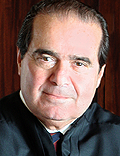March 28, 2012 — This morning's oral arguments in the Supreme Court case on the Affordable Care Act (ACA) revolved around a seemingly hypothetical question: If the high court were to invalidate the law's requirement for individuals to obtain health insurance, what happens to the rest of the law? Should it, too, be struck down?
The question seems less hypothetical, however, after yesterday's 2-hour hearing on the individual mandate. The proceedings led some legal experts to say that the court's 5-member conservative majority, based on the skepticism it exhibited, could very well void the mandate as a Congressional infringement on individual liberty.
Attorney Paul Clement, representing the 26 state officials and the National Federation of Independent Business (NFIB) in their challenge of the law, told the justices that if the individual mandate is deemed unconstitutional, "the rest of the act cannot stand."
"What you would end up with is a hollow shell," said Clement. He said the court should erase the entire law and give Congress a "clean slate" for enacting healthcare reform.
US Deputy Solicitor General Edwin Kneedler conceded that a few key ACA provisions would need to go if the individual mandate is voided. However, he also argued that most of the law should remain intact, particularly as Americans are already benefiting from some of its reforms, such as keeping young adults on their parents' health plans up to age 26 years. They would lose that coverage, he warned, if the court invalidated the law from A to Z.
As in the ACA hearings on Monday and Tuesday this week, all of the justices, with the exception of Justice Clarence Thomas, jumped into the opposing attorneys' presentations with questions and, seemingly, opinions. Justice Antonin Scalia, a member of the court's conservative wing, seemed to show his hand on the severability issue when he said, "My approach would say if you take the heart out of the statute, the statute's gone."
In contrast, Justice Sonia Sotomayor, a member of the court's more liberal wing, suggested that the justices could preserve the ACA if the court voids the mandate and lets Congress amend it with other provisions that would accomplish the mandate's objective.
"So if we strike just a tool, why should we strike the whole act, when Congress has other tools available?" Sotomayor asked. "What's wrong with leaving it...in the hands of the people who should be fixing this, not us?"
Only 1 Lower Court has Struck Down Entire Law
Opponents of the ACA have challenged it in more than 2 dozen federal lawsuits, and lost most of them. Only once have they convinced a court to declare the entire law unconstitutional. That happened in the case that officials from 26 states and the NFIB filed in a district court in Pensacola, Florida. There, US District Judge Roger Vinson voided the mandate as overstepping Congress' Constitutional authority to regulate commerce, and as he viewed the mandate as "inextricably bound" to the law's remaining provisions, he then canned the entire ACA.
An appeals court in Atlanta, Georgia, also declared the mandate unconstitutional, but said the rest of the ACA could stand. That appellate ruling is now under review by the Supreme Court, which will settle the severability matter once and for all.
Government Says Most of Law Does Not Affect States, NFIB
To convince the high court that the mandate and ACA are "inextricably bound," Clement today cited the government's own argument that the law's dramatic health insurance reforms hinge on everyone obtaining coverage. Absent any mandate, the government contends, it would be counterproductive to require private insurers to guarantee coverage to everyone and base premiums on "community rating"; that is, on age, geographic area, family size, and tobacco use, but not on preexisting conditions.
The reason? Healthy Americans could wait until they were seriously ill before they applied for their guaranteed insurance, leaving private insurers in the meantime with a risk pool of sick and expensive individuals. This "adverse selection" would force insurers to raise premiums to unaffordable levels for an ever-shrinking number of customers, and the private health insurance industry would wither, according to the government.
The state officials and the NFIB have noted that the ACA bears ample evidence that Congress viewed the mandate as pivotal and indispensable. In addition, an early healthcare reform bill in Congress featured a severability clause to prevent 1 unconstitutional apple from spoiling the barrel, but that clause is missing in the enacted law.
In response, Deputy Solicitor General Kneedler said today that the state officials and the NFIB are not affected by most of the ACA's provisions, and therefore lack a good reason to seek their overthrow if the mandate is voided. Kneedler disagreed that Congress viewed the ACA as an all-or-nothing proposition. However, if the high court were to declare the mandate unconstitutional, said Kneedler, it should only abolish guaranteed coverage and community rating, not the entire law.
"Friend of Court" Says Reforms Could Work Minus Mandate
Stepping into the legal ring today with the Obama administration and the ACA's challengers was attorney H. Bartow Farr III. The court appointed Farr as a "friend of the court," or amicus curiae, to argue that the rest of the law could stand if the mandate is gaveled down.
Farr disagreed with the government's position that guaranteed coverage and community rating would backfire minus the mandate. He cited a Congressional Budget Office study stating that ACA premium subsidies would encourage a broad range of Americans to obtain coverage, and thus mitigate the effects of adverse selection. The ACA also has other provisions that would bring healthy people into the insurance risk.
Invalidating the entire law, Farr said today, "is an example of the best driving out the good."
Even without the mandate, the ACA "would still open the insurance market to millions of people and lower premiums for millions," said Farr.
The high court holds its last hearing on the historic ACA case this afternoon. The justices will listen to oral arguments, and freely interrupt with questions, on the constitutionality of Medicaid expansion that the law sets in motion. The court will issue a ruling in the case sometime before July.
Robert Lowes has disclosed no relevant financial relationships.
The question seems less hypothetical, however, after yesterday's 2-hour hearing on the individual mandate. The proceedings led some legal experts to say that the court's 5-member conservative majority, based on the skepticism it exhibited, could very well void the mandate as a Congressional infringement on individual liberty.
Attorney Paul Clement, representing the 26 state officials and the National Federation of Independent Business (NFIB) in their challenge of the law, told the justices that if the individual mandate is deemed unconstitutional, "the rest of the act cannot stand."
 |
Paul Clement
|
US Deputy Solicitor General Edwin Kneedler conceded that a few key ACA provisions would need to go if the individual mandate is voided. However, he also argued that most of the law should remain intact, particularly as Americans are already benefiting from some of its reforms, such as keeping young adults on their parents' health plans up to age 26 years. They would lose that coverage, he warned, if the court invalidated the law from A to Z.
 |
Justice Antonin Scalia
|
 |
Justice Sonia Sotomayor
|
"So if we strike just a tool, why should we strike the whole act, when Congress has other tools available?" Sotomayor asked. "What's wrong with leaving it...in the hands of the people who should be fixing this, not us?"
Only 1 Lower Court has Struck Down Entire Law
Opponents of the ACA have challenged it in more than 2 dozen federal lawsuits, and lost most of them. Only once have they convinced a court to declare the entire law unconstitutional. That happened in the case that officials from 26 states and the NFIB filed in a district court in Pensacola, Florida. There, US District Judge Roger Vinson voided the mandate as overstepping Congress' Constitutional authority to regulate commerce, and as he viewed the mandate as "inextricably bound" to the law's remaining provisions, he then canned the entire ACA.
An appeals court in Atlanta, Georgia, also declared the mandate unconstitutional, but said the rest of the ACA could stand. That appellate ruling is now under review by the Supreme Court, which will settle the severability matter once and for all.
Government Says Most of Law Does Not Affect States, NFIB
To convince the high court that the mandate and ACA are "inextricably bound," Clement today cited the government's own argument that the law's dramatic health insurance reforms hinge on everyone obtaining coverage. Absent any mandate, the government contends, it would be counterproductive to require private insurers to guarantee coverage to everyone and base premiums on "community rating"; that is, on age, geographic area, family size, and tobacco use, but not on preexisting conditions.
The reason? Healthy Americans could wait until they were seriously ill before they applied for their guaranteed insurance, leaving private insurers in the meantime with a risk pool of sick and expensive individuals. This "adverse selection" would force insurers to raise premiums to unaffordable levels for an ever-shrinking number of customers, and the private health insurance industry would wither, according to the government.
The state officials and the NFIB have noted that the ACA bears ample evidence that Congress viewed the mandate as pivotal and indispensable. In addition, an early healthcare reform bill in Congress featured a severability clause to prevent 1 unconstitutional apple from spoiling the barrel, but that clause is missing in the enacted law.
In response, Deputy Solicitor General Kneedler said today that the state officials and the NFIB are not affected by most of the ACA's provisions, and therefore lack a good reason to seek their overthrow if the mandate is voided. Kneedler disagreed that Congress viewed the ACA as an all-or-nothing proposition. However, if the high court were to declare the mandate unconstitutional, said Kneedler, it should only abolish guaranteed coverage and community rating, not the entire law.
"Friend of Court" Says Reforms Could Work Minus Mandate
Stepping into the legal ring today with the Obama administration and the ACA's challengers was attorney H. Bartow Farr III. The court appointed Farr as a "friend of the court," or amicus curiae, to argue that the rest of the law could stand if the mandate is gaveled down.
 |
H. Bartow Farr III
|
Invalidating the entire law, Farr said today, "is an example of the best driving out the good."
Even without the mandate, the ACA "would still open the insurance market to millions of people and lower premiums for millions," said Farr.
The high court holds its last hearing on the historic ACA case this afternoon. The justices will listen to oral arguments, and freely interrupt with questions, on the constitutionality of Medicaid expansion that the law sets in motion. The court will issue a ruling in the case sometime before July.
Authors and Disclosures
Journalist
Robert Lowes
Robert Lowes is a journalist for Medscape Medical News. A former senior editor at Medical Economics magazine and contributor to numerous healthcare publications, Robert has covered medicine from almost every conceivable angle — public policy, managed care, education, ethics, medical malpractice, information technology, billing and collections, waiting-room design, and first-degree murder. His articles have won major awards such as first place in the annual journalism competition of the National Institute for Health Care Management, and several have been republished in books. Robert also is an anthologized poet. He can be contacted at rlowes@medscape.net.Robert Lowes has disclosed no relevant financial relationships.
Comments
Post a Comment